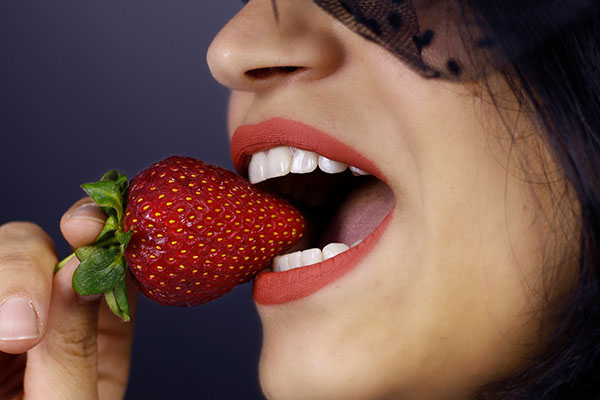 For those who suffer from damaged teeth, veneers can offer a natural-looking, long-lasting option to restore a beautiful and healthy smile. However, patients with these dental restorations should take extra care to protect them. Some dietary changes may be necessary for complete care.
For those who suffer from damaged teeth, veneers can offer a natural-looking, long-lasting option to restore a beautiful and healthy smile. However, patients with these dental restorations should take extra care to protect them. Some dietary changes may be necessary for complete care.
Foods and beverages that can damage veneers
Most foods that are unhealthy for natural teeth are also unhealthy for veneers. However, even some healthy choices require extra care, preparation, or moderation for those with this type of dental work.
Hard, crunchy foods
Anything that places excessive pressure on veneers can cause damage to the surface or bond. Biting directly into hard or crunchy foods can lead to damage, especially if it happens on a regular basis. Patients should take care when eating certain types of foods, including:
- Carrots
- Whole apples
- Corn on the cob
- Extra-crunchy chips, such as corn or kettle-cooked
- Hard candies
When possible, cut fruits and veggies into smaller pieces and chew on the side when eating crunchier foods. Hard candies are not good for overall dental health and should be avoided altogether.
Tough, chewy foods
Foods that are tough or hard to chew can also be risky. These items can become lodged between teeth and along the gum line, creating more opportunities for bacteria and decay. Thick-crusted breads, tough cuts of meat, jerky, dried fruits, and sticky candies can also loosen veneers, which will then require prompt repair or replacement.
Alcohol
Studies have shown that excessive alcohol consumption can hamper saliva production and increase the risks for oral cancer. In addition, alcohol can lessen the strength of the adhesives used to hold veneers in place. Along with limiting the number of alcoholic beverages consumed, patients should also avoid using alcohol-based mouth rinses, as these can have the same weakening effect.
Dark or acidic foods and beverages
Veneers are susceptible to staining. However, traditional whitening treatments are not effective or safe for these restorations. Therefore, patients should avoid or limit choices known to cause stains, including coffee, tea, soft drinks, and red wine. Highly acidic foods and drinks can also affect the look and strength of the veneer material. Rinse the mouth or brush right away after consuming these kinds of items, such as citrus fruits and tomatoes.
Other habits to avoid with veneers
As well as dietary choices impacting the appearance and longevity of veneers, some poor practices can be just as harmful. Crunching down on cold ice is an unhealthy habit for all patients, but especially those who wear veneers. Just like eating crunchy foods, this habit can damage the porcelain and wear down the bonding agent. Any type of tobacco use can lead to unsightly staining, deterioration, and higher cancer risks. Opening packages or pulling apart objects with the teeth is incredibly dangerous and can easily cause a dental emergency. Finally, poor oral hygiene practices can impair the look and durability of veneers.
Conclusion
Small dietary and lifestyle changes can make a large impact on the look and lifespan of dental veneers. In addition to these tips, patients should follow all instructions from the dentist for lasting results.
Request an appointment or call Artisan Dental at 425-454-2005 for an appointment in our Bellevue office.
Related Posts
Dental veneers are thin shells that are attached to the front surface of a patient’s teeth to improve their appearance. Over the years, dental veneers have become increasingly popular. Veneers can be used to treat a variety of cosmetic concerns. Read on to find out if you might be a good candidate for veneers.Veneers are…
Dental crowns and dental veneers are two different types of restoration treatments. A dental veneer fits over the front of the tooth, while a crown fits over the whole thing. If you are wondering whether a single tooth can have both a crown and a veneer, the answer is no. A tooth can support either…
A dental veneer can last for more than 20 years in many cases. However, getting the most out of your veneers requires caring for them properly. In this review, we discuss tips to ensure that your dental veneers last for well beyond a decade without needing any major restorations or replacements.In many ways, caring for…









